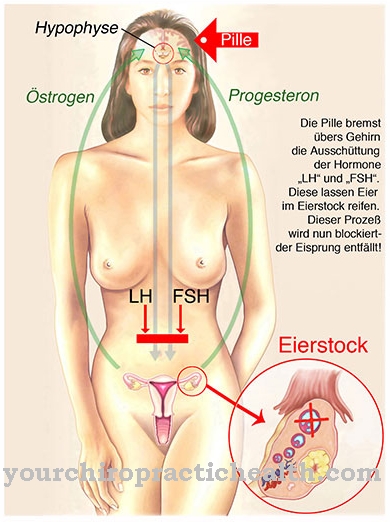The so-called Shrink kidney, which ultimately represents advanced kidney scarring, can - if left untreated - cause a loss of kidney function. Urinary poisoning occurs in the final stage. The shrunken kidney is a disease that often goes unnoticed for a long time.
What is a shrink kidney?

© Rasi - stock.adobe.com
If the kidney becomes smaller and smaller, it is called a so-called shrink kidney. The Shrink kidney weighs an average of 80 grams; in many cases the weight can be significantly less. The size is around eight by four centimeters.
Various reliable methods are available so that the scope and structure can be recognized, whereby the medical professionals rely exclusively on the ultrasound method. Occasionally - if a shrunken kidney has been diagnosed - further changes can also be determined; in many cases the renal cortex also shrinks.
causes
A shrunken kidney can arise from high blood pressure, circulatory disorders, chronic inflammation (favored by bacteria) or from drugs that damage the kidneys or from diabetes. If the patient suffers from extremely high blood pressure, the result is a shrink kidney; the shrunken kidney also causes blood pressure to rise, leading to significant circulatory problems.
As a result, the kidneys are constantly attacked. For this reason it is important that this vicious circle is broken - as quickly as possible. On the other hand, the "one-sided shrink kidney" occupies a special position. This is caused by calcification of the blood vessels, with bacteria that can trigger chronic inflammation sometimes promoting a one-sided shrink kidney. This can also promote high blood pressure, so that the second kidney is also attacked.
Symptoms, ailments & signs
The following symptoms are characteristic of a shrunken kidney: The patient complains of swollen legs (water retention), suffers from loss of appetite, is exhausted, complains of muscle cramps and visual disturbances, is afflicted with severe itching and repeatedly has fevers and headaches.
The first symptom that indicates a damaged kidney is fluid build-up in the tissues. Shrinking kidneys cause swelling of the eyelids, ankles or even the lower legs. However, those swellings that are caused by the retention of water do not immediately indicate a shrunken kidney; there are numerous other diseases that can also cause symptoms like this.
If the person concerned has to go to the toilet again and again, whereby the urge to urinate at night is particularly intense, one can assume advanced kidney damage. However, if only very small amounts of urine are excreted, this can sometimes be an indication that the kidney is about to lose its function.
Diagnosis & course of disease
Doctors often diagnose the shrunken kidney as part of a routine examination. The doctor notices changed values, which can be determined by a urine test. The doctor discovers protein and blood in the urine; these are two substances that should not normally be found in the urine.
The protein makes the urine cloudy; the additions of blood make the urine dark yellow to red. This is followed by a physical examination. First the doctor taps the kidney area, where he can sometimes find water that has already been stored. If the doctor does a blood test, he can recognize high creatine values (kidney values) if the kidney is shrunken.
An ultrasound scan is performed so that the doctor can be sure that the kidney is shrunken. Subsequently, tissue samples can also be taken from the kidneys; however, these measures are only carried out by a specialist in nephrology.
Complications
A shrunken kidney almost always leads to renal insufficiency. First of all, the disease causes high blood pressure and other cardiovascular complaints such as ventricular fibrillation and cardiac arrhythmias. In extreme cases, this leads to a heart attack and thus often to the death of the sick person. A kidney transplant poses long-term health risks.
The surgery often results in chronic diseases of the cardiovascular system, diabetes mellitus and virus infections. A transplant also promotes the development of tumors such as skin or kidney cancer. The kidney transplant itself can also become ill - chronic allograft nephropathy occurs, which often leads to organ failure even years later. Classic rejection reactions such as fever and pain are also not unlikely with a kidney transplant.
Dialysis can also result in complications. Infections of the surgically placed vascular access, drops in blood pressure and the formation of blood clots are possible, for example. As a result of a thrombosis, the procedure must be stopped and the access reopened - often associated with further pain and stress for the patient. An increased protein and potassium intake can lead to life-threatening metabolic disorders as part of blood washing. An increased phosphate content can promote vascular damage such as arteriosclerosis.
When should you go to the doctor?
A shrunken kidney must always be treated by a doctor. This disease cannot heal itself, so that the person affected is always dependent on medical treatment. If the shrunken kidney is not treated, in the worst case it can lead to kidney insufficiency and thus to death of the person concerned. The earlier the shrunken kidney is recognized, the better the further course of this complaint will be. A doctor should be consulted if the person concerned suffers from swollen legs.
The legs swell for no particular reason and the affected person also suffers from water retention. Severe and above all sudden visual problems or severe headaches and fever can also indicate the shrunken kidney. Most patients also experience nighttime urination and swollen eyelids. If these symptoms occur, you should definitely consult a doctor. The shrunken kidney can be treated by an internist. There are no particular complications.
Treatment & Therapy
The doctor only decides on a therapy when he has been able to find out the exact definition of the disease. If the doctor has found the shrunken kidney at an earlier stage, only the urine and blood values are checked at the beginning. However, if there is a bacterial infection, the patient must be treated with antibiotics.
If the shrunken kidney results from a disorder of the immune system, special medication is administered, which then suppresses the immune system so that it cannot work “against itself”. Water retention is treated with dehydrating medication as part of the symptom treatment. As a result, the patients also receive antihypertensive agents, since the shrunken kidney is responsible for high blood pressure.
If the adrenal gland is already restricted, there is an acute danger to life, so that the patient - several times a week - has to undergo so-called blood washing (dialysis). In the end, if the patient is in the last stage of the disease, there is no more cure. The last resort is a new kidney.
prevention
Shrinking kidneys can very well be prevented as long as people make sure that they drink enough fluids. For this reason, it is important that the recommended amount (two liters of water a day) is actually consumed. Subsequently, people who suffer from high blood pressure should take action against it so that there is no further stress on the body (and no further stress on the kidneys).
Aftercare
The shrink kidney usually results in a complete loss of function of the organ. Follow-up care focuses on checking prescribed medication and adjusting it if necessary. The remaining kidney must also be checked to ensure that it is still working. In addition, the doctor conducts a detailed conversation with the patient, during which the further procedure is discussed.
In addition, it must be clarified whether a kidney transplant is an option. If both kidneys are damaged, measures must be taken to enable a transplant in a timely manner. Chronic complaints such as neuropathy or a congested lung must also be checked after follow-up care. After complications such as renal insufficiency or renal hypertension, therapeutic measures are also part of the follow-up care.
The physical complaints sometimes cause psychological problems, such as anxiety disorders or moods, which need to be clarified. As part of the follow-up care, the doctor creates a final report and sometimes also gives the patient general tips. The aftercare of the shrunken kidney is carried out by a specialist in internal medicine. Patients usually suffer from chronic illnesses that must be checked regularly. Monthly or even weekly visits to the doctor are typical and must be maintained permanently.
You can do that yourself
Permanent medical supervision is necessary in the case of a shrunken kidney. Those affected have to be treated in a hospital because the organ is on the verge of complete loss of function.
The self-help measures are limited to taking the medication according to the doctor's instructions and adhering to the strict diet. In addition, therapy should always be used. Affected people are best advised to consult a self-help group in order to exchange ideas with other affected persons. Immediate treatment is required for complications such as kidney failure. The sick have to be treated by an emergency doctor and then observed in the hospital. If you have high blood pressure, the medication must be adjusted. People with a shrunken kidney must have their emergency medication with them so that immediate action can be taken in the event of acute complications. If ventricular fibrillation develops, medical advice is also required.
In some cases, kidney function can be partially restored. The prerequisite for this is that the causes of the shrunken kidney are identified. It is best for patients to keep a complaint diary in which they note all symptoms and complaints. The doctor can use this information to determine a trigger more quickly and initiate appropriate therapy. In addition, various homeopathic remedies, such as arnica and aloe vera, help against the pain.



.jpg)

.jpg)


















.jpg)



